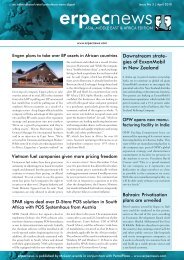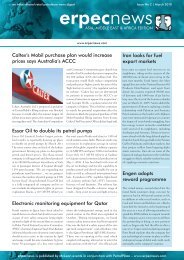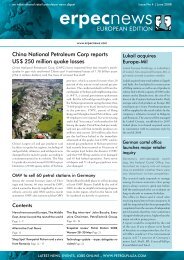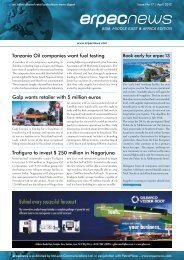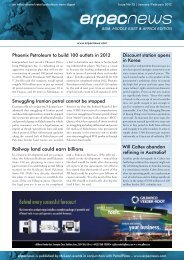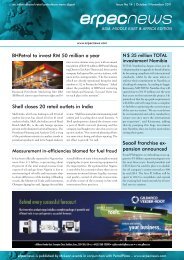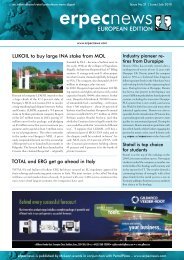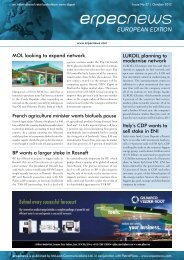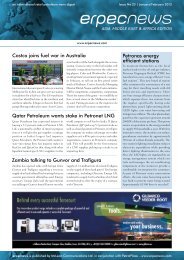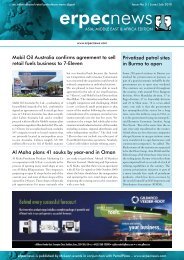You also want an ePaper? Increase the reach of your titles
YUMPU automatically turns print PDFs into web optimized ePapers that Google loves.
Key account Manager David Casanova and<br />
Market Development Manager Javier Díaz,<br />
were our primary meeting partners for the<br />
day. after a quick briefing in the boardroom<br />
we were quickly moved on to meet with the<br />
Quality Manager Álvaro Vilar and the lean<br />
Support Manager Javier Correa, who would<br />
take us on to the factory floor and guide us<br />
step by step, through their manufacturing<br />
procedures. as mentioned earlier in this<br />
article, Istobal’s production line is based on<br />
the lean manufacturing system, fashioned<br />
and styled originally by Japanese car manufacturer<br />
Toyota, the principles of which are<br />
used throughout the world today by some of<br />
the largest manufacturers in the world. The<br />
lean manufacturing system is also known<br />
as lean Production – ‘Doing more for less’,<br />
driven by five key areas of manufacturing.<br />
Cost, quality, delivery, safety and staff morale.<br />
Underpinning this, as Álvaro and Javier<br />
explained are seven key principles.<br />
Reduced Setup Times: all setup practices<br />
are deemed to be wasteful as they add no<br />
value and tie up labour, so by organising<br />
things differently, workers are trained to do<br />
their own setups. Small-Lot Production:<br />
Producing things in large batches results<br />
in high-speed dedicated machinery costs,<br />
extended lead times and larger defect costs.<br />
Employee Involvement and Empowerment:<br />
Organise workers in teams with a team<br />
leader and give them each the responsibility<br />
and training to do many specialised tasks.<br />
Teams should be given responsibility for<br />
housekeeping and minor equipment repair.<br />
Quality at the Source: Since workers are<br />
in the best position to discover a defect and<br />
to immediately fix it, they are assigned this<br />
responsibility. If a defect cannot be readily<br />
fixed, any worker can halt the entire line by<br />
pulling a cord called a Jidoka. Equipment<br />
Maintenance: assign operators primary<br />
responsibility for basic maintenance, since<br />
they are in the best position to defect signs of<br />
malfunctions. Pull Production and Justin-time:<br />
The quantity of work performed at<br />
each stage of the process is dictated solely by<br />
demand for materials from the immediate next<br />
stage. Supplier Involvement: Suppliers are<br />
partners and an integral element of the lean<br />
manufacturing. Suppliers are trained in ways<br />
to reduce setup times, inventories; defects,<br />
machine breakdowns etc., and take responsibility<br />
to deliver their best possible parts.<br />
For someone like me who had only ever made<br />
something you might sit on, the whole process<br />
as explained to us was truly fascinating.<br />
It was no surprise that we started our tour<br />
where each factory worker starts every morning,<br />
at one of the 20 group meeting points<br />
or GaP’s spread throughout the factory. In<br />
keeping with the lean manufacturing model<br />
we are shown yesterdays production figures,<br />
how the group is performing to overall targets<br />
and made aware of any problems that<br />
need dealing with. Usually workers spend<br />
5 minutes doing this everyday and they<br />
seem to unreservedly welcome it. Going too<br />
far maybe, might be to say that they almost<br />
seem to generate a degree of pride from the<br />
whole process. all the information workers<br />
see is designed to allow them to operate on<br />
a more informed basis, whilst having a group<br />
hug at the same time i.e. serious bonding with<br />
other members of the team, which normally<br />
amounts to 10 – 15 people in each.<br />
We were told as we walked around that the<br />
Product Development Department has the<br />
challenging task of applying new technological<br />
advances to the design and manufacture of<br />
Istobal’s products. The engineers work with<br />
a combination of the most up-to-date CaD<br />
design and CaM construction programs to<br />
achieve optimum levels of quality. The designs<br />
are taken from high tech computers and turned<br />
into real products by the different sections of<br />
Istobal’s workshops, where, part by part, the<br />
various components of Istobal’s products are<br />
made. The robots used in the car industry<br />
also play an important role in the Istobal plant,<br />
where they are used in the welding process.<br />
The company say they take great efforts to<br />
guarantee the quality of parts and machines<br />
through on-going training programmes and by<br />
integrating new quality control systems into<br />
the processes of manufacturing and assembly.<br />
The Treatment of Surfaces Workshop was<br />
also fascinating and ensures that the various<br />
metal parts that make up the product get the<br />
most suitable protective coatings and finishes.<br />
The steel structures actually go through a five<br />
stage process: Stripping, Hot dip galvanizing,<br />
microcrystalline phosphate coating, Epoxy<br />
polyamide primer coating and finally a two<br />
component polyurethane resin coating. There<br />
are 21 stages in the whole process.<br />
The latest piece of equipment in Istobal’s<br />
high tech production line is the Nordson<br />
Prodigy Power Port. a ‘Star Trek’ type spray<br />
paint machine in plain English, which is<br />
more akin to an amusement park attraction<br />
the way it allows large multi coloured pieces<br />
of steel to be effortlessly moved around in a<br />
start finish cycle, suspended high above the<br />
factory floor. Throughout the visit we regularly<br />
stopped at other GaP’s meeting points to see<br />
a different set of tables, group targets and<br />
key initiatives, designed for another group of<br />
workers, but also it meant we had time to enjoy<br />
another cup of strong Spanish coffee, which<br />
I have to admit on a number of occasions I<br />
ISTObAL – CELEbrATING 60 yEArS OF SUCCESS<br />
Sandra Stroppel from petrolplaza, meets Quality Manager<br />
Álvaro Vilar, Lean Support Manager Javier Correa<br />
the first stage at which we see recognisable car wash parts<br />
the Lean production process being demonstrated by<br />
Álvaro and Javier at one of the 20 Gap’s meeting points<br />
the nordson prodigy power port, sending ready painted<br />
batches of car wash parts across the factory floor<br />
one of eight car washes manufactured that day, for oMV<br />
LATEST NEwS, EvENTS, jObS ONLINE – www.PETrOLPLAzA.COM 15



